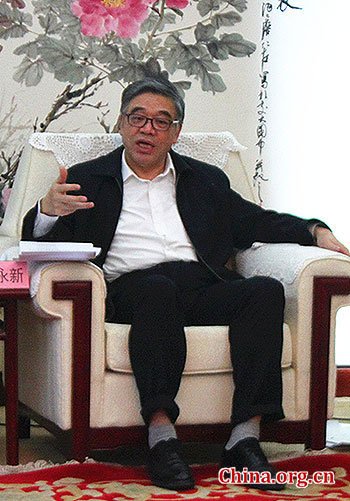CPPCC member: Rural vocational education not enough
china.org.cn / chinagate.cn by Zhang Rui, March 4, 2017 Adjust font size:
 |
|
Zhu Yongxin, deputy secretary general of the Chinese People's Political Consultative Conference (CPPCC). [Photo/China.org.cn] |
Zhu Yongxin, deputy secretary general of the Chinese People's Political Consultative Conference (CPPCC), said on Thursday that secondary vocational education is aimed at the grassroots level however the available resources had yet to meet the demands of rural poverty alleviation.
Zhu, who is also a veteran educator and vice chairman of China Association for Promoting Democracy, told China.org.cn this was the subject of one of the proposals he would submit to China's top political advisory body, which was beginning its annual meeting in Beijing on Friday.
"The key to completing the task of building a well-off society in the 13th Five-Year Plan (2016-2020) is to alleviate the poverty of tens of millions of the rural population."
"Secondary vocational education is the closest to poor people and grassroots workers, which can directly help them improve skills and salary. So, education can do a lot for poverty alleviation, but for now the resources cannot match the needs."
According to him, there are three aspects of problems. First, the infrastructure of secondary vocational education schools is inadequate to provide high-quality vocational education for students. "The practical equipment is old, sometimes even outdated, and has been eliminated from market for years. They are not attractive to students at all."
Second, the relevant administrative departments have been treating vocational schools the same as managing academic education; as a result, the schools cannot launch independent training programs and cannot release the potential needed to train poor people. The training classes set by the national program have no close links to market needs, while the educational funds come from various departments and there is no information-sharing among them.
Third, the high-quality vocational education resources in developed areas such as Beijing, Shanghai, and Guangzhou cannot help students from the poverty-stricken area due to restrictions in recent years.
For example, Beijing vocational education schools cannot enroll students from other cities and areas without government approval. Students from outside of Beijing who obtain their education through cooperative programs and temporary schools cannot receive subsidies from both their hometown and Beijing, Zhu said.
He proposes a national secondary vocational education rural poverty alleviation program to send the young adults with working potential to good schools, and track and manage graduates to ensure they can be employed on a long-term basis.
He also believed the government should open vocational education to various social entities to provide education and resources according to local situations and industry needs, while breaking down the barrier between developed and underdeveloped areas, so that poor students can get education in the former but get subsidies wherever they go.